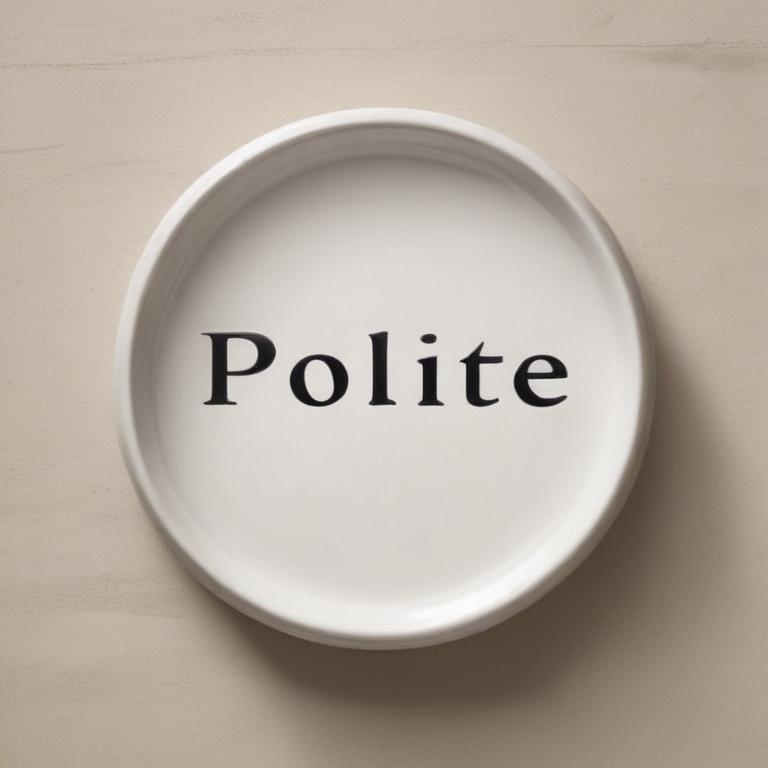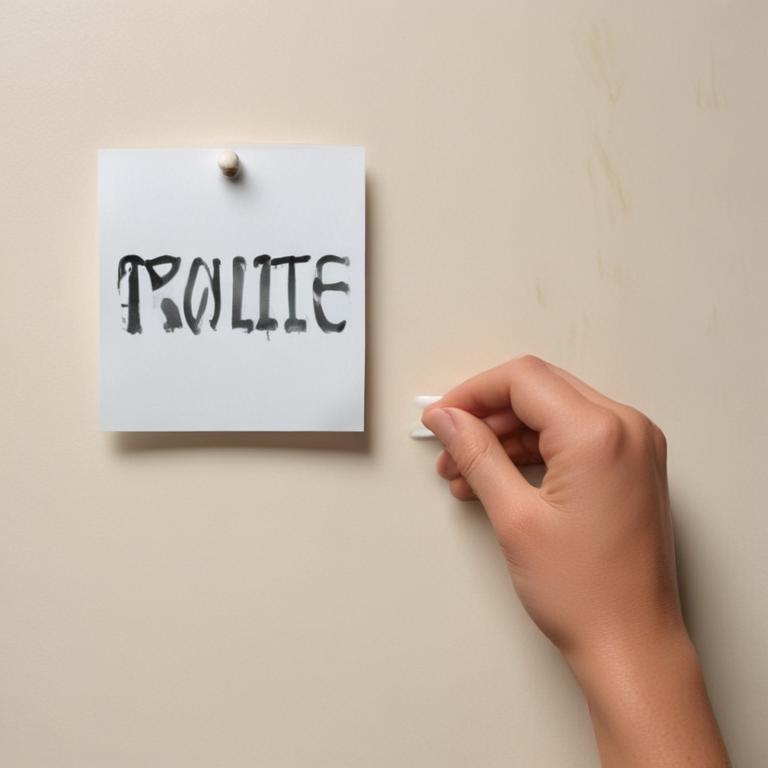发音 (Pronunciation):
IPA: /pəˈlaɪt/
中文近似: 坡赖特
中文意思与词性 (Meanings & Part of Speech):
- 有礼貌的,客气的 (adj.)
- 文雅的,文明的 (adj.)
例句 (Examples):
1. She is always polite to everyone she meets.
(她对遇到的每个人都很有礼貌。)
2. He gave a polite smile and nodded his head.
(他礼貌地微笑着点了点头。)
用法提示 (Usage Tip):
“Polite”强调行为举止礼貌,常用于描述人的性格或行为。注意和“courteous”“civil”等词的区别:courteous 更正式,civil 偶有“表面客气,实则冷淡”之意。
更多关于 "polite" (More about "polite")
单词来源 (Etymology)
“polite” 源自拉丁语 “politus”,意为“抛光的、光滑的”,后来引申为“修饰过的、有教养的”,再到现代英语中的“有礼貌的”。
词根词缀解析 (Root & Affix Analysis)
词根 polit- 源自拉丁语,意为“打磨”,后来引申为“修饰、教养”。后缀 -e 为形容词结尾,整体表示“已经经过修饰、抛光”的,引申为“有礼貌的”。
“polite”的字母与词根个性化解读
字母象形/引申义 (个性化参考)
- 字母 'p' 的象形或引申含义可能包括: 手/脚 (P=F); 手掌 -> 平; 棒子 (P=B); 音变: P=B=M=F=V。
- 字母 'o' 的象形或引申含义可能包括: 眼睛/嘴 (圆形) -> 张开, 转动; 圆柱; 音变: A=E=I=O=U=W=Y。
- 字母 'l' 的象形或引申含义可能包括: 拉长, 长 (line); 舌头 -> 说 (language); 细, 少; 音变: L=M=N=R。
- 字母 'i' 的象形或引申含义可能包括: 我 (an, any, one -> 人); 水滴 -> 水 (ice); 尖, 一点, 小 (inch); 元音互换: A=E=I=O=U=W=Y。
- 字母 't' 的象形或引申含义可能包括: 顶端 -> 记号/标志; 手杖 -> 抓 -> 手 -> 伸展 -> 指示代词; 支撑 -> 站立; 三叉 -> Tr转换/转; 分叉; 音变: T=D=S=TH。
- 字母 'e' 的象形或引申含义可能包括: 眼睛 (窗户符号引申); 向外 (ex-变体); 元音互换: A=E=I=O=U=W=Y。
词根/组合解读 (个性化参考)
- 单词中的片段 'ol' (源自词根/组合 'ol') — 含义: 生长, 成长 (al变形); 词根; (来源提示: ol = al 变形); (音变参考: a=o).
- 单词中的片段 'it' (源自词根/组合 'it') — 含义: 走; (来源提示: exit=ex+it).
学习提示:以上针对单词 polite 的字母和词根解读,主要基于提供的特定象形及词根资料。这些提示旨在启发联想,而非绝对定论。更通用的记忆规则和原则请参考首页。英语词源复杂多变,实际应用中请结合更全面的词源词典和语言学知识进行深入学习。
常用词组 (Common Phrases)
- polite conversation: 客套的对话
- polite request: 礼貌的请求
其他语言 (Other Languages)
- 德语: höflich
- 法语: poli
字母整体创意联想
polite 单词中的 p像一位点头鞠躬的人,o像嘴巴表达友好的微笑,l像站立的绅士,i像细致周到的个人,t像一把小礼帽,e像转弯的手势,整体看上去像一个彬彬有礼的人在向你问好。
逐字母创意解读
中文谐音助记
“polite” 谐音“破礼他”——不能“破坏礼貌对待他人”,记住要“polite(有礼貌)”。
相关电影/名言
"It pays to be polite."
(有礼貌是值得的。)
- 《小鬼当家》(Home Alone, 1990)
趣味知识/故事
在英国文化中,polite(有礼貌)被视为传统美德,人们常常会用“please”“thank you”等表达礼貌。甚至有学者统计过,英国人平均一天会说 20 多次“sorry”,以表达礼貌和谦逊。
拓展信息
在正式场合或商务英语中,“polite” 常用来评价举止和言谈,如“polite greeting(有礼的问候)”。
与“kind”(善良)、“friendly”(友好)等词语的区别在于,“polite” 更强调行为上是否合乎礼节,并不代表内心的情感。
形容词最高级为 “the most polite” 或 “politer”(较少用),通常推荐用“more polite”。
网络参考 (More about "polite" from the Web)
POLITE Definition & Meaning - Merriam-Webster
Learn the meaning, usage, and history of the adjective polite, which describes someone or something that shows good manners, taste, or culture. Find synonyms, antonyms, example sentences, and related words for polite in the online dictionary.
POLITE | English meaning - Cambridge Dictionary
Learn the meaning of polite, an adjective that describes someone who behaves in a way that is socially correct and shows respect for others. See synonyms, antonyms, usage examples and related words for polite.
Polite - definition of polite by The Free Dictionary
Learn the meaning, usage and origin of the adjective polite, which means showing good manners or refinement. Find synonyms, antonyms, translations and examples of polite in different contexts.
更多图片 (polite More Images)

